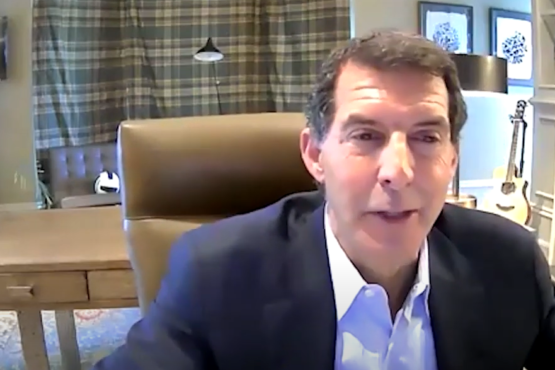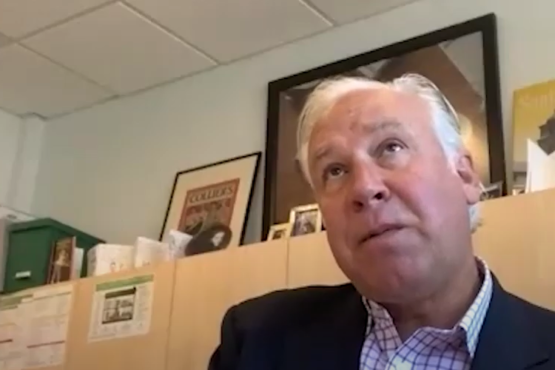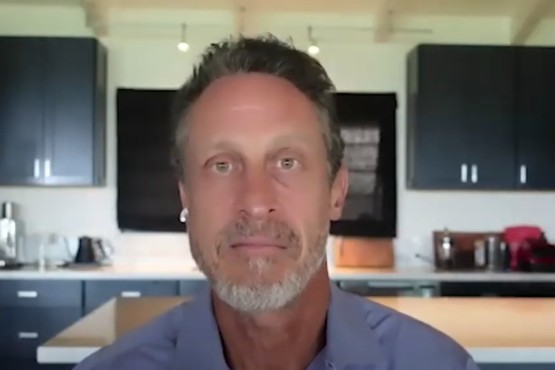We often hear about how the tech companies of Silicon Valley are looking to solve our health and healthcare challenges. And we’re lucky to have with us Facebook’s Dr Freddy Abnousi. Freddy is doing just that type of work. He is a practicing interventional cardiologist and has a unique role as a physician leading Facebook’s efforts around health and healthcare. We’ll hear a little bit more on what that actually means. Freddy also serves as Innovation Advisor to the American College of Cardiology, professor adjunct at Stanford University School of Medicine and assistant professor adjunct at Yale University School of Medicine. In our conversation, we rethink American health in the context of today’s rapidly changing technology. And now please join me and our guest for a second opinion. Freddy, thanks so much for being with us today.
Bill Frist: Welcome to a Second Opinion podcast, where we are rethinking American health. I’m your host Senator Bill Frist. To make sense of all the dynamic perspectives in healthcare, you need a trusted source engaging at the intersection of policy, medicine and innovation. You need a second opinion, a podcast where it all comes together. In our fourth episode, we get to hear from Facebook’s Head of Healthcare Research, my friend Dr. Freddy Abnousi. But before we dive in, I want to thank our sponsors. A Second Opinion is powered by Tivity Health, lifestyle brands that transform healthy living for adults through nutrition, fitness and social connection. We’re also brought to you by the Blue Cross Blue Shield Association. In every community and every state, Blue Cross and Blue Shield is solving America’s healthcare challenges, breaking down barriers, preventing disease, opening doors to care for the health of America. Now let’s turn to the episode.
Bill Frist: We often hear about how the tech companies of Silicon Valley are looking to solve our health and healthcare challenges. And we’re lucky to have with us Facebook’s Dr Freddy Abnousi. Freddy is doing just that type of work. He is a practicing interventional cardiologist and has a unique role as a physician leading Facebook’s efforts around health and healthcare. We’ll hear a little bit more on what that actually means. Freddy also serves as Innovation Advisor to the American College of Cardiology, professor adjunct at Stanford University School of Medicine and assistant professor adjunct at Yale University School of Medicine. In our conversation, we rethink American health in the context of today’s rapidly changing technology. And now please join me and our guest for a second opinion. Freddy, thanks so much for being with us today.
Freddy Abnousi, M.D.: Thanks so much for having me.
Bill Frist: People ask me all the time, cardiac surgery to politics to policy and now to business. You’ve got to be crazy. I’m going to flip this on you now that I have the opportunity. Why in the world does a cardiologist have this, not detour, but this sort of change in direction and end up at a place like Facebook.
Freddy Abnousi, M.D.: Thank you for asking. This essentially goes back to what we do as a core in a hospital, which is take care of patients. For me now, dealing with acute heart attacks for the most part and historically similarly before you were doing more transplants, and one of the things I’ve realized over time is if you’re interested in moving the needle for public health, even though we do a really great job in taking care of acute heart attack patients across the country, regardless of how many of those heart attacks you fix, it ultimately will never move the needle for the public’s health. And if your focus is trying to impact that then you have to be able to step out of the hospital and think about where health really actually happens, which is outside of the hospital.
Freddy Abnousi, M.D.: And as such, I decided to not leave medicine because I still practice about a day a week, but spend the majority of my time outside of that, focus on trying to understand and hopefully impact what I consider to be the primary driver of health [inaudible] in America, which is the social and behavioral variables that we don’t quite have a great grasp on in an actionable way.
Bill Frist: Well, let’s come back to because that’s sort of the why, to have that bigger, larger, probably no more important, but larger impact. But again, you’re an interventional cardiologist, which means you like using your hands to change the course of medical disease in a patient. There must’ve been something that clicked here or maybe when you were a young kid. Where did the interest come from?
Freddy Abnousi, M.D.: I trained in public health, right? I have a Masters in health policy and an MBA and I spent a bunch of time with organizations like McKinsey on the ground in Uttar Pradesh, in India, looking at fraud for primary care for the World Bank and most recently besides Facebook at Google, thinking about how we can try to impact public health. And I will say the reason why this didn’t happen five years ago is because once you realize that every time you treat an acute heart attack patient, you’re literally bringing them back from the abyss for the most part. And in that context, you have to wonder why the hell are we doing this now? Why could we not do more to prevent this disease from starting? And are there essentially other drivers of health outcomes that we could potentially implement in a scalable way that impacts public health as opposed to going at the disease now.
Freddy Abnousi, M.D.: As a father, I’ve got three little kids and my hope is that we don’t have to wait for the system to break down with each one of my children before we put them on the right path. And I think of it the same way for my parents as I want them to prevent getting disease rather than get a disease and then treat it. And for that purpose, I think it behooves us as a population to spend more time thinking about prevention and less time, perhaps, focus on rescuing those people from the abyss.
Freddy Abnousi, M.D.: And in fact, you know this better than I do, but if you’re ill, this place, this country is the greatest place to be. But if you’re well, there’s really not much for you. And so everybody comments about the medical care, sick care versus health care. And I think from my perspective, the best good we could do is try to prevent people from getting ill in the first place. And so to do that you have to understand what the primary drivers of health outcomes are in America. And then if you do that, the next step becomes, well, it looks like the biggest bucket we’re not really focused on for prevention happens to be these social and behavioral variables so let’s try and take a crack at figuring that out.
Bill Frist: And the why Facebook.
Freddy Abnousi, M.D.: Yeah.
Bill Frist: There are lots of social sort of platforms that you could have chosen. Did Facebook come and pick you out of a crowd or you were the most avid user of Facebook and they said, “Okay, this guy’s going to be the one?” Because Facebook people don’t usually think of health.
Freddy Abnousi, M.D.: Yeah.
Bill Frist: And here they’ve got a full fledge, board-certified cardiologist who’s out doing the stuff of miracles in terms of life-saving procedures. How was that marriage of the Facebook?
Freddy Abnousi, M.D.: One was merit based and the other was network based, let’s say. The merit basis from my perspective, if you want to try and address or at least understand the social and behavioral variables, you’ve got to go to where people understand that. And I think the reason why the majority of variables we have today are unactionable is because the data set that has been studied to date has been lacking the granularity and complete understanding of a human being and their families and friends and communities.
Freddy Abnousi, M.D.: And there’s only one place in the world that really solved for that very well today. There’s other social networks, etc so you can imagine from a merit perspective, if you’re choosing where to go, this would be the only place you would go. And it doesn’t help that I live about 10 minutes from there so that’s nice. The second thing is I’d spent a stint at Google thinking about certain public health interventions for cardiovascular disease and the person I ended up meeting there ended up running the Incubator Science-driven Building 8 at Facebook, which was meant to be this new way to do innovation driven by the DARPA model. Regina Dugan is the person who recruited me to Facebook and we worked together at Google briefly and she was instrumental for me to be firstly convinced as an interventional cardiologists to go to Facebook, which was not an easy decision, particularly if you’re on an academic track.
Freddy Abnousi, M.D.: Because at that point you’re applying for grants, you’re figuring out what the next 10 years are going to look like. It was a combination where I really felt that from a public health perspective there’s no place more challenging but also potentially more fruitful to try to impact the population and at the same time the opportunity arose because Regina was just really convincing.
Bill Frist: Facebook, we all know Facebook and it has such huge reach and I work with a group called Nashville Health here that you and I have talked about, which is a population-based Rube. 700,000 people live in Nashville and we want to increase our overall health. As a cardiac surgeon, I can’t do that. I can operate on a few hundred people here in town every year. But that’s it, so I’ve turned to more population health measures and then trying to lift that whole population up. Talk me a little bit through sort of the social determinants of health. Not health care but health.
Freddy Abnousi, M.D.: Let me start first by saying that we can’t do any of this alone. I mean to preface that, right? Much like you say, you can only operate on a few hundred people. I don’t think healthcare can do this alone. I don’t think tech can do this alone. I don’t think Facebook can do this alone. I think in order for this to work, everyone as you said, has to come together sitting around a table and decide that firstly, the things that matter are morbidity, mortality and disparity. And we need to lift our populations up so a values-decision first. And then secondly, building out the case to make it work. Of course, being mindful of privacy and security, of course, being mindful of delivering value to people, but at the same time with the values that like we’re coming together to do this because none of us can do this alone.
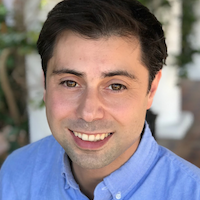
American College of Cardiology, Professor Adjunct at Stanford University School of Medicine, and Assistant Professor Adjunct at Yale University School of Medicine. He has previously led innovative healthcare efforts at companies such as McKinsey and Google, and has served as Founder and CMO of CorDynamix Inc., an interventional heart failure company. He completed Fellowships in Cardiovascular Medicine and Interventional Cardiology, as well as Residency in Internal Medicine at Stanford University Medical Center. He was previously a resident surgeon at the University of California, San Francisco. He completed his MD at Stanford University School of Medicine, MBA from Oxford University, and MSc in Health Policy, Planning, & Financing from the London School of Economics.
Freddy Abnousi, M.D.: Okay, so let me just preface that by saying. Take a step back. Say, Senator, you know that I often harp on this. There’s four things that impact health outcomes in America. One’s exposures. The second is access to quality care. The third is genetics, and the fourth is social/behavioral variables. The place that you spent such a long person of your life dedicated to, and that I spend the majority of my working life dedicated to, is the access to quality care. And the bad news is that it only impacts health outcomes by about 10% in America.
Bill Frist: And so that’s important. That’s healthcare, whether it’s the delivery, the insurance, the doctors, the patients, the hospitals. Only 10%.
Freddy Abnousi, M.D.: If we put a hospital and give access to good quality care on every corner, our entire health outcomes will not significantly improve. That to me is the basis for an existential crisis, given where I’ve focused my attention, right? And I imagine one of the reasons why you’ve been so passionate about Nashville Health is a similar [crosstalk 00:00:10:34]. All right, let’s talk about the three other things. Exposures are about 5% so if you get exposed to asbestos, for example, you’re not going to do as well in a significant way as compared to someone who hasn’t been. Genetics account for about 30% and we think about genetics as a source code for nature. There’s lots of data proves that we still have a bunch of work to do to get there, but we’ll eventually get to a point where we can impact that positively. And then finally, it’s this glob, this social/behavioral variables, which is a primary driver of health outcomes, about 55% of health outcomes in America. Now, the problem with the social and behavior variables is often-
Bill Frist: Give the examples of social/behavioral again. We’re talking about everything from seat belts to your immediate environment, transportation, access to Internet, housing, food. What else?
Freddy Abnousi, M.D.: I would say that they all fall under three categories. And then there’s sub categories thereafter. But generally speaking, the last seven decades of research in this arena points towards the main levers that we have to action to impact health outcomes are income, education, and race. And under that would fall things like transportation, housing insecurity, food insecurity and so forth. The issue with these social determinants is that they’re quite high level and at best correlational. And I suspect that for a number of people, if you correct for income education right away or if you correct for transportation and food insecurity right away, they will still continue to be ill.
Freddy Abnousi, M.D.: And that is a hypothesis, but put that aside for a sec. If we’re sitting in clinic and I’m trying to impact your income, your education or your race, even though I know the primary drivers of your health outcomes is going to be something having to do with that than clearly it’s not actionable. And so as a clinician there’s no way that works. What I’d like to do is be in a position someday to actually have an actual set of social determinants that we can get to, right? Now, this is not to say you shouldn’t focus on the things that we know work, right? You should exercise, you should not smoke, you should eat a diet that is calorie-restricted and rich on vegetables and fish and so forth. But on top of that where we can help with transportation, food insecurity and housing is secure, we should do all of that. But that is just not attainable for everyone all the time. It also essentially becomes a role of government at some point.
Freddy Abnousi, M.D.: And what I’m suggesting is that those high level things, which we often think of as social determinants, if we dig deeper, perhaps there’s a set of principle components that go into making up income, education and race, which may be are actionable. And if we understand those, we start to walk towards understanding this nurture source code, if you will, where we can finally have a scalable solution that’s not just applicable to one group versus another. That we can try to implement through policy and change and try to implement through improved health care provision. Designing around the consumer as opposed to designing around the physician, designing around the patient as opposed to designing around the healthcare system. Ultimately, I think understanding the social/behavioral variables at a principle component level, which we haven’t really done yet, gets us to a place where we can A. Directly impact health outcomes and then B. Take bread and butter technology, hydroclorothiazide, ace inhibitors, cholesterol-lowering medicines, so forth, and get people to be compliant with them and ultimately prevent disease.
Speaker 3: And now a thank you to the partners that made this podcast possible. Tivity Health does health differently. It promotes a proactive approach at achieving a healthy lifestyle that embodies the leading social determinants of health, food insecurity, physical activity and social connection. With its family of healthy lifestyle brands, including Silver Sneakers and Nutrisystem, Tivity Health is making an impact in reducing factors that lead to serious health issues and high medical costs such as chronic conditions, obesity, inactivity, social isolation and loneliness. To learn more, go to tivityhealth.com.
Speaker 5: Right now 77% of rural American needs more primary care doctors. That’s why we’re training former military medics to serve communities in need right now. Childhood Asthma causes 14 million missed school days each year. That’s why we’re using our data to help kids breathe easier. Blue Cross and Blue Shield companies are working to solve the nation’s health care challenges because we believe everyone should have access to healthcare. Opening doors to care for the health of America.
Bill Frist: I get it to make them actionable, which means leverageable where you can pull a crank and something’s going to happen or go to scale or reach large population and have an impact. But how do you start at that basic level to get to see what is actionable or scalable or can be executed on?
Freddy Abnousi, M.D.: This is not quite actionable, but let me walk you through an example in literature that starts to show us, as we get more granular, we’re heading in the right direction. The nurses’ health study, there was a paper published in Circulation Researchers. Circulation is a pretty good journal for us. A couple of years ago in 2017 and it looked at a subset of the population from a nurse’s [inaudible] study ran out of Massachusetts. 76,000 women over about 20 years. And the goal of this study was to assess the risk factors for acute MI and deadly MI in generally healthy women.
Freddy Abnousi, M.D.: A bunch of nurses who signed up with a very low morbidity to start with. And they followed them over 20 years. They had looked at three buckets of things to assess what their risk factors were and one … Let’s also give them some props because women were not well-studied in cardiovascular disease. They’re still not well-studied, but this was a really good look. The three buckets of thing that they looked at are clinical things: Hypertension, diabetes, obesity and so on. Second bucket was often what gets confounded into [inaudible] social determinants of health, but we consider often lifestyle things. Don’t smoke, don’t drink or smoking, how you eat and whether you exercise or not.
Freddy Abnousi, M.D.: And we, as you know, we often term those lifestyle modifications when we do them in clinic. And then the third bucket, which is the first time really I’ve noticed a good example of separating out some things which could be social determinants that we haven’t traditionally thought of, is they looked at social integration as a third factor of a risk factor for having cardiovascular disease for women. And social integration was defied by the Berkman-Syme’s Index, which was a index developed in the ’70s, not in a time of social networks.
Freddy Abnousi, M.D.: It looked at things that sort of make sense. Number of friends you have, number of groups you’re a part of, number of hours per week per group, whether you’re married or not, whether you go to church and so forth. And what they found, if you control for all the clinical things, if you control for all the lifestyle things, including smoking, which was surprising to me, you have a significantly P0001 I think if I remember correctly, significantly higher chance of having a deadly MI if you’re in the least socially-integrated group versus the highest quartile. And so that’s not actionable, but as you get more granular and understand the individual and their community, it starts to transition more away from income, education and race. This is not simply a food and transportation issue. The way they looked at it was how locked into your community are you?
Freddy Abnousi, M.D.: And I have to say my suspicion is that if we do a bunch of research towards this, at the end of the day, we will be trying to recreate what human beings were like a couple of hundred years ago where we were really in tune to each other. We live real close. We understood each other innately. We saw those red flags and we took care of each other. And the whole goal is to be able to understand these and scale them so that if I’m working 60, 80 hours a week, whatever it is, Katha Hospital or at Facebook, I don’t necessarily have the time that I used to spend with my father. And perhaps I can understand I don’t have to be there all the time. Now, is that a good thing? That’s a whole separate conversation, but it would allow us to finally start to restratify and dedicate resources in a more appropriate way.
Freddy Abnousi, M.D.: And we talked about precision health from a genomics perspective, mostly for oncology right now. But I think precision health really applies to the human being and from the social perspective as well. In order to deliver appropriately, you have to understand who that human being is, what their habits are and your health designations, your healthcare interventions should revolve around them.
Bill Frist: And today’s technology … And is that why the Facebook interests you because with technology today, it gets a little bit closer to whether it’s social interaction or loneliness or how we interact with each other?
Freddy Abnousi, M.D.: Yeah, I mean that’s exactly right. Facebook, from an outsider’s perspective, which I had a couple of years ago, you can imagine it’s clear that there’s the majority of adults are on that service for a lengthy period of time each day and they interact with each other all the time. And so there was some work historically that looked at platform interactions and these hidden signals within platforms that were indicative [inaudible 00:19:39]. One example that Sandy Pentland had talked about historically from MIT was young women as a transition to mental health problems, particularly suicide, they changed the way they interact within their network from essentially having fewer relationships that are fairly deep versus many relationships that are fairly shallow as a marker of potentially badness about to happen.
Freddy Abnousi, M.D.: And so there’s been signals in the literature around this type of thing for a long period of time. I do think that … I mean clinically most of the questions we ask are around how people interact with their world, right? How many pillars are behind your back? How many steps can you take? Can you walk up to driveway? What’s your exertional capacity essentially and so forth? All of those questions we’re asking how do you interact with the platform? And so from an outsider’s perspective, I know that most people spend a lot of time on Facebook and that is a platform that you’re interacting with. And there’s lots of tools to interact with and as such there has to be this concept of social biomarkers that are indicative over a long period of time of health and disease. And so perhaps we can use that to understand and impact health.
Bill Frist: When you really look at it and you say that health, not healthcare, not the cardiology you did and the cardiac surgery you and I did, which was healthcare, but the health is around all of the other things that we’ve been talking about. And in the social media platforms broadly, all of those things, that other stuff is really central. It’s not necessarily the driving force behind the social media, but it’s there. Eventually if that’s where all of this sort of interaction is going on today, and we know interaction ultimately with environment, with ourselves, with other friends, is what determines in greater part than cardiology or cardiac surgery, health. There’s something there. And I know we’re really early on with that. Just again for our listeners, because you and I have talked a lot about it in the public literature, how much time do people spend on social media today? What does the data show?
Freddy Abnousi, M.D.: Public information, which has been published is about 90% of adults in America, if I recall that correctly, spend about 50 minutes a day on the platform. And those are averages and of course they change over time. And this probably predates where we are today by a few years, but that’s immensely powerful.
Bill Frist: And that’s on Facebook alone?
Freddy Abnousi, M.D.: Correct. If you consider the other networks as well, it just essentially adds up on top of it.
Bill Frist: Yeah. Well, that doesn’t include Instagram.
Freddy Abnousi, M.D.: That’s just Facebook.
Bill Frist: And I guess I’m really very optimistic about that. I know we have all sorts of privacy issues and opting in and opting out. We put all that aside. The fact that the social determinants in the broadest sense, which you defined in your fantastic paper, are so potentially powerful to change the course of individual’s lives and family’s lives. It leads me to be tremendously at least optimistic at this point.
Freddy Abnousi, M.D.: But Senator, what have we got to lose?
Bill Frist: Yeah.
Freddy Abnousi, M.D.: Of course you’ve got to do this for privacy, security, all that stuff, right? But what have we got to lose? We continue year on year, in my opinion, the greatest nation in the world, being at the bottom of the OECD list of premature mortality for essentially every major category every single year. What do we got to lose? If you look across the country, people are dying in Mississippi at a life expectancy of 65 years of age. What have we got to lose? Why would we not try this if we think it’s important? It behooves us to come together and say we have to do this. We owe it to ourselves. We owe it to our nation to be the role model that we try to be for the world, right?
Freddy Abnousi, M.D.: I think it comes back to if you care, you should understand and try to help. And again, this is, as a clinician as opposed to not my Facebook hat, but as a clinician is that I mean the only reason we signed up to be physicians is try and help. And if we can do that at a larger scale and particularly for this country who’s not doing well from the healthcare standpoint or health outcomes perspective, of course we should.
Bill Frist: I think if you look at population health, you look at community health, if you look at the health of a city, a state or the country, you can’t help but to think there’s integration of social interaction, which is reflected through social media. And our healthcare delivery system through an integration can help change its course in history. Well, listen, it’s great to be with you again and I personally look forward to working with you both as a cardiac surgeon, as a cardiologist, but maybe even more importantly in this capacity of population health and public health, social determinants and moving ahead. Thank you very much for being with us today.
Freddy Abnousi, M.D.: My pleasure. Thanks for having me.
Bill Frist: Thanks, Freddy. Thank you, man.
Bill Frist: This episode of a Second Opinion was produced by Todd Schlosser, the Modest Creative Group Team and Snapshot Interactive. You can subscribe to a Second Opinion on Apple Podcast or wherever you are listening right now. And be sure to rate and review a Second Opinion so we can continue to bring you great content. You can get more information about this show, it’s guest and sponsors at secondopinionpodcast.com. Thank you again to our sponsors, Tivity health and the Blue Cross Blue Shield Association. Be sure to join us for our next episode with Dr. Rashika Fernandopulle. Rashika has designed a new model of primary care delivery that challenges the core assumptions of US healthcare and produces at better health outcomes at lower costs. Thank you for joining us for a Second Opinion. Engaging at the intersection of policy, medicine and innovation.

